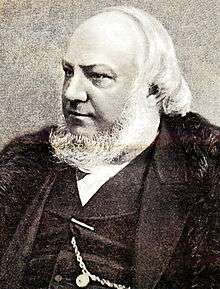Jacob Moleschott
Jacob Moleschott (9 August 1822 – 20 May 1893) was a Dutch physiologist and writer on dietetics. He is known for his philosophical views in regard to scientific materialism. He was a member of German Academy of Sciences Leopoldina (since 1884).
Jacob Moleschott | |
|---|---|
 Moleschott in 1892 | |
| Born | 9 August 1822 |
| Died | 20 May 1893 (aged 70) |
| Nationality | Dutch |
| Education | Heidelberg University |
| Era | 19th-century philosophy |
| Region | Western philosophy |
| School | German materialism[1] |
| Institutions | Heidelberg University University of Zürich University of Turin University of Rome |
Main interests | Philosophy of science |
Influenced
| |
Life
Born in 's-Hertogenbosch, Moleschott studied at Heidelberg University and began the practice of medicine in Utrecht in 1845, but soon moved back to Heidelberg University, where he lectured on physiology starting in 1847. The university reprimanded Moleschott for various controversial statements made in his lectures, leading to his resignation in 1854. Afterwards, he was a professor of physiology at Zürich (1856), at Turin (1861), and at Rome (1879), where he died.
Writings
Moleschott explained the origin and condition of animals by the working of physical causes. He was an atheist.[3] His characteristic formulae were "no thought without phosphorus" and "the brain secretes thought as the liver secretes bile." His major works are:
- Lehre der Nahrungsmittel. Für das Volk (Erlangen, 1850; 3rd edition, Erlangen, 1858)
- Physiologie der Nahrungsmittel (1850; second edition, 1859)
- Physiologie des Stoffwechsels in Pflanzen und Thieren (1851)
- Der Kreislauf des Lebens (1852; fifth edition, 1887)
- Untersuchungen zur Naturlehre des Menschen und der tiere (1856–93), continued after his death by Colosanti and Fubini
- Sulla vita umana (1861–67), a collection of essays
- Physiologisches Skizzenbuch (1861)
- Consigli e conforti nei tempi di colera (1864; third edition, 1884)
- Sull' influenza della luce mista e cromatica nell' esalazione di acido carbonico per l'organismo animale (1879), with Fubini
- Kleine Schriften (1880–87), collected essays and addresses
- Für meine Freunde (1894)
Notes
- Owen Chadwick, The Secularization of the European Mind in the Nineteenth Century, Cambridge University Press, 1990, p. 165: "During the 1850s German ... scientists conducted a controversy known ... as the materialistic controversy. It was specially associated with the names of Vogt, Moleschott and Büchner" and p. 173: "Frenchmen were surprised to see Büchner and Vogt. ... [T]he French were surprised at German materialism".
- John Powell, Derek W. Blakeley, Tessa Powell (eds.), Biographical Dictionary of Literary Influences: The Nineteenth Century, 1800-1914, Greenwood Publishing Group, 2001, "Pavlov, Ivan Petrovich (1849–1936)."
- Harmke Kamminga (1995). The Science and Culture of Nutrition, 1840-1940. Rodopi. p. 31. ISBN 978-90-5183-818-3.
Moleschott's atheism is much more prominent, for example, and he declares absurd Liebig's opinion that insights into the laws of nature inevitably lead us to the notion of a Being knowable only through revelation.
References
- Fredrick Gregory: Scientific Materialism in Nineteenth Century Germany, Springer, 1977, ISBN 90-277-0760-X

External links
| Wikisource has original works written by or about: Jacob Moleschott |
| Wikimedia Commons has media related to Jacob Moleschott. |
- Short biography and bibliography in the Virtual Laboratory of the Max Planck Institute for the History of Science
- The Popular Science Monthly, Volume 49 Sketch of Jacob Moleschott